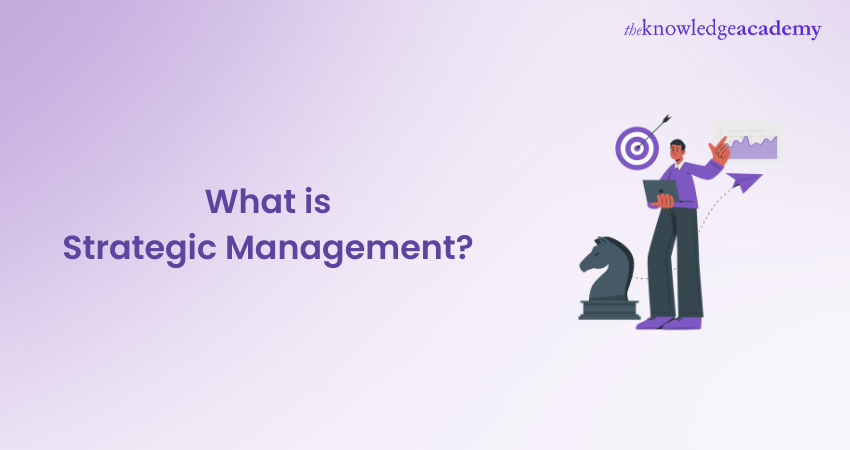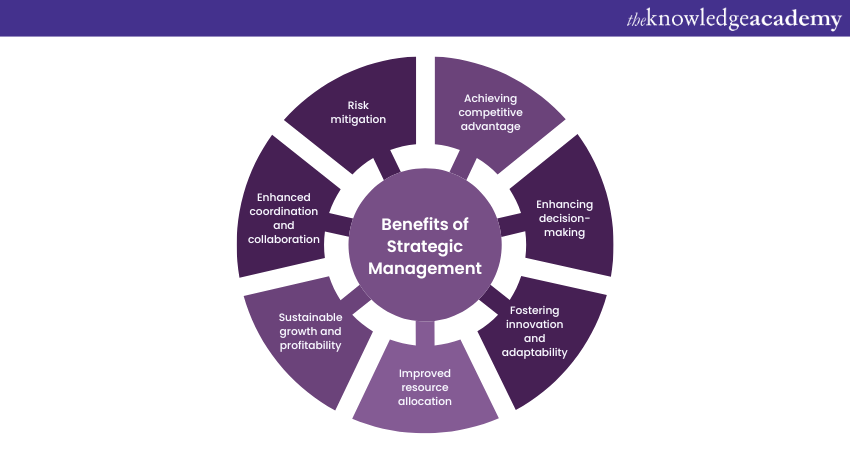We may not have the course you’re looking for. If you enquire or give us a call on +44 1344 203999 and speak to our training experts, we may still be able to help with your training requirements.
Training Outcomes Within Your Budget!
We ensure quality, budget-alignment, and timely delivery by our expert instructors.

From pandemics to global economic shifts, businesses encounter many challenges and uncertainties daily. In such a rapidly evolving environment, understanding "What is Strategic Management?" becomes essential in steering organisations toward resilience and success. This strategy enables companies to make well-informed decisions, anticipate potential disruptions, and adapt quickly. It helps businesses capitalise on opportunities, minimise risks, and sustain a competitive advantage.
If you are looking to adopt this strategic approach in your organisation and propel it towards success, this blog is designed for you. Here, we will discover the essentials of Strategic Management, the processes it involves, and its advantages.
Table of Contents
1) What is Strategic Management?
2) The five phases of Strategic Management
3) Types of Strategic Management strategies
4) Benefits of effective Strategic Management
5) Deciphering SWOT Analysis in Strategic Management
6) The role of a Balanced Scorecard in Strategic Management
7) Conclusion
What is Strategic Management?
Strategic Management is an ongoing process where organisations plan, apply, and review strategies to meet their goals. It involves setting clear objectives, making well-informed choices, and arranging resources to ensure long-term success and maintain a competitive edge. This process helps organisations understand their Strengths, Weaknesses, Opportunities, and Threats (SWOT) to develop strategies that make the most of their advantages while reducing risks.
It starts with defining a clear vision and mission for the organisation. After this, detailed strategic plans are created to help in decision-making and managing resources. These plans are carried out through various projects and initiatives, with regular checks to measure performance against set goals and ensure that they align with the overall strategy.
The five Phases of Strategic Management
Strategic Management unfolds through five essential phases, each critical for the successful navigation and implementation of an organisation's Strategic plan. These five stages are as follows:
a) Goal setting: This process involves determining the organisation's vision and mission. It helps in the formulation of Strategic planning by developing clear, continuous goals that focus on the company’s objectives. In this phase, all members are made familiar with the organisation's objectives and their contributions to goal attainment.
b) Analysis: This stage requires undertaking an in-depth analysis of the internal and external environments. Internally, it discovers the strengths and weaknesses of the organisation. In the external direction, it assesses the opportunities and threats that exist in the marketplace or industry, typically utilising tools, for example, SWOT (Strengths, Weaknesses, Opportunities, Threats) or PESTEL (Political, Economic, Social, Technological, Environmental, Legal) analysis. Comprehensive analysis, therefore, provides strategic decision-makers with crucial insights based on which they can make decisions.
c) Strategy formulation: This phase is based on all the introspection that has been carried out in stage one. It requires creating goal-oriented approaches to realise the organisation's objectives. It necessitates weighing out options and making a strategic plan that uses strong points, balances the weaknesses, opens opportunities and reduces risk factors.
d) Strategy implementation: This stage is for the execution of the strategies that were developed. It includes processes like resource allocation, team assembling, establishing deadlines, and initiating actions, which are a prerequisite to Strategic objectives achievement. Its successful implementation demands coordination of staff at all levels of organisation including the staff who know their roles and what is expected from them.
e) Evaluation and control: The last phase encompasses the evaluation of outcomes and appraising the implementation plan against the predetermined objectives. This ongoing monitoring process facilitates the detection of any discrepancies from the established plan and the execution of corrective measures. It assures appropriate adjustments of the organisation to its goals and to the changing internal or external environment.
Types of Strategic Management strategies
There are different types of Strategic Management strategies. These types are as follows:
a) Cost leadership: The strategy involves gaining the position of the lowest-cost producer in the industry, which allows the company to charge lower prices than competitors or achieve higher profitability.
b) Differentiation: This strategy emphasises producing or offering uncommonly different products or services that distinguish them from all other products in the marketplace. Hence, the brand is able to charge them a premium price.
c) Focus: This strategy allows a firm to narrow its list of potential customers to either a certain geographical area, a particular product line, or a specific market segment. The shared purpose is to serve a certain group of customers better than competitors who go for the entire market.
Improve skills for making informed decisions in leadership roles with our CMI Level 7 Training – join today!
Benefits of effective Strategic Management
Adopting an effective business strategy brings about many positive aspects to an organisation’s efficiency and competitiveness. Let's explore some of the key advantages:

a) Achieving competitive advantage: Strategic Management helps businesses discover their strengths and employ them to achieve a leading position over their competitors. By matching resources and capabilities with market reality, companies can become market leaders, thus differentiating themselves from their rivals.
b) Enhancing decision-making: A Strategic approach involves thorough analysis and data-driven decision-making. By considering both internal and external variables, leaders could make wiser choices that would lead to better outcomes with minimal risks. This guarantees that these are not impulsive decisions but are based on proven data with strategic alignment.
c) Fostering innovation and adaptability: A successful Strategic Management system endorses creativity across the organisation. By leading a culture of innovation and experimenting, businesses can adjust swiftly to changes in the market, advances in technology, and customer trends.
d) Improving resource allocation: Strategic Management works out the capital and labourcation efficiently. Through linking resources with key initiatives, organisations omit the wastage of funds and concentrate only on projects, which add value to the organisation in the long run.
e) Sustainable growth and profitability: Firms that possess effective Strategic Management are way more suitable for long-term durability and profitability. By means of constant reviewing and amending Strategies, businesses are able to react to the changes, capture opportunities and minimise the risks that may affect the future of their business.
f) Enhancing coordination and collaboration: Strategic Management stimulates the natural flow of information and collaboration across different groups and functions. It thus encourages functional integration, catalysing the overcoming of complex challenges and generating joint knowledge and skills.
g) Risk mitigation: Strategic Management involves risk assessment and contingency planning. By assessing possible risks and formulating risk mitigation strategies, businesses will be better equipped to face uncertainties, thus protecting their operations and limiting the adverse impacts of negative events.
Elevate your career with our expert-led Management courses. Enroll today to become a dynamic leader!
Deciphering SWOT Analysis in Strategic Management
SWOT Analysis plays an important role in Strategic Management that helps organisations identify their strengths, weaknesses, opportunities, and threats. By deciphering these elements, businesses can craft strategies that capitalise on their internal strengths and opportunities while solving risks associated with their weaknesses and external threats.
This analysis helps align organisational strategies with the competitive landscape and market conditions, ultimately supporting informed decision-making and strategic planning.
The role of a Balanced Scorecard in Strategic Management
The Balanced Scorecard is a Management and planning system used in business and industry, government, and nonprofit organisations worldwide. It provides a framework for translating an organisation’s strategic objectives into coherent performance measures.
The Balanced Scorecard enables organisations to define their vision and strategy and convert them into actionable steps. It integrates financial measures with key performance indicators around customer perspectives, business process improvements, and learning and growth initiatives. This approach ensures that companies are not only measuring their financial outcomes but also the drivers of future performance.
Conclusion
Understanding "What is Strategic Management" is essential for any organisation aiming to navigate the complexities of today's business environment effectively. This approach helps align the company's objectives with actionable strategies and empowers leaders to anticipate changes, optimise performance, and sustain competitiveness. With this approach, businesses can ensure they are not merely reacting to market dynamics but are proactively managing and shaping their futures.
Learn strategic decision-making and analytical skills with our CMI Level 7 Certificate in Strategic Management and Leadership Practice – join today!
Frequently Asked Questions

Strategic Management is an excellent career for those passionate about shaping the direction of businesses and organisations. It offers the opportunity to make significant impacts on an organisation's success, provides exposure to various industries and functions, and leads to high satisfaction and competitive compensation.

Important terms in Strategic Management include vision, mission, goals, objectives, and SWOT analysis (Strengths, Weaknesses, Opportunities, Threats). It also involves strategic planning, strategic implementation, strategic control, corporate strategy, and so on.

The Knowledge Academy enhances global learning with a vast selection of over 30,000 online courses, accessible in more than 490 locations across 220 countries. This expansive reach ensures accessibility and convenience for learners worldwide.
Our diverse Online Course Catalogue covers 17 essential categories, complemented by a wealth of free educational Online Resources. These resources include up-to-date News, informative Blogs, tutorial videos, interactive webinars, and collections of Interview Questions. Furthermore, professionals looking for personalised education can take advantage of TKA's customisable Course Bundles, crafted to enrich and optimise the learning journey.

The Knowledge Academy's Knowledge Pass, a flexible prepaid voucher system, offers the freedom to join in courses over a 12-month period. Start your limitless learning adventure with us and embrace education that knows no bounds.

The Knowledge Academy offers various CMI Level 7 Training, including CMI Level 7 Award in Strategic Management and Leadership Practice Training, CMI Level 7 Certificate in Strategic Management and Leadership Practice Training and CMI Level 7 Diploma in Strategic Management and Leadership Practice Training. These courses cater to different skill levels, providing comprehensive insights into Strategic Leadership and Management.
Our ILM, CMI Leadership & Management Blogs cover a range of topics offering valuable resources, best practices, and industry insights. Whether you are a beginner or looking to advance your Business Improvement skills, The Knowledge Academy's diverse courses and informative blogs have you covered.
Upcoming Business Skills Resources Batches & Dates
Date
 Introduction to Management
Introduction to Management
Fri 14th Feb 2025
Fri 11th Apr 2025
Fri 13th Jun 2025
Fri 8th Aug 2025
Fri 10th Oct 2025
Fri 12th Dec 2025







 Top Rated Course
Top Rated Course



 If you wish to make any changes to your course, please
If you wish to make any changes to your course, please


